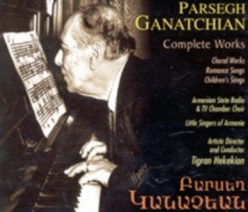
Khatchatur I. Pilikian, London, United Kingdom
 Khatchatur I. Pilikian
Khatchatur I. PilikianI received a website where it shows that the noted Armenian song, titled ADANA LAMENT, with lyrics and tune echoing the tragedy of the 1909 massacre of 30,000 Armenians Of Adana –perpetrated by the newly established Young Turks government– is now plagiarized musically, with its lyrics distorted in Turkish, titled SEBABIM ASK=Love is the Cause. Hence, an entire peopleթ§Չ-Չ§s tragic lament has become a love song in the language of those who caused the tragedy itselfթ§Չ-Թ»
It is true that few years back, Said Chetinoglu had the courage of his conviction when he expressed his disgust against such depravity, saying, թ§Չ-խit is not enough we massacred them, now we do not let them express their grief.թ§Չ-Չ§
But the fact remains that the depravity of impostors has no limits. The fields of arts and music also are fertile grounds for such acts of vandalism.
It is worth highlighting the cultural and historical truth that imitating, copying and translating are indispensable tools of learning. The depravity of impostors abusing such tools of cultural intercourse is an insult to genuine cultural freedom, especially after a tragic history of vandalising and plundering the indigenous heritage to claim pseudo-paternity of usurpers for the looted cultural remains. Such acts are now labelled as cultural genocide. Hence the struggle against the depravities of such impostors is essential to safeguard genuine cultural freedom.
 Barsegh Kanatchian
Barsegh KanatchianThere are also politically motivated plagiarists who distort cultural facts for the unbecoming motives of disinformation. Internet’s recent list of the national origin of composers as authors of the National Hymns of Countries contains a silly disinformation related with the supposed name and nationality of the composer of the National Hymn of the 3rd Republic of Armenia. He is mentioned as being a Turk, named Barsegh Kanatchian!
Poor Kanatchian! He was born in 1885, in Rodosto, and died in 1967, in Beirut, after disseminating Armenian musical culture for many post-genocide decades in the Middle East.
He had nothing at all to do with the composition of that lament of a tune of the current National Hymn. Author unknown and already intoned two decades before Kanatchian was born, the said tune was set to a poem written in 1861, titled, Song of the Italian Maiden, by the noted Armenian revolutionary poet, Mikael Nalbandian, who was born in Crimea, in 1829, and died in prison in Tsarist Russia, in 1866. The poem was in itself a nationalist lament for the “misery stricken, forlorn fatherland, trampled upon by enemies”–in this case, Italy, of course.
 Aram Khatchaturian
Aram KhatchaturianBecause Barsegh Kanatchian was born in Ottoman Turkey, our 3rd Republic’s lamentable National Hymn’s composer is ‘baptised’, and erroneously so on many accounts, as a Turkish composer…The ‘mistake’ of the Internet has been fed it seems from the latter-day sophists of the latter-day ‘Mammon infested’ 3rd Republic of Armenia. Kanatchian’s name is spelled in Eastern Armenian pronunciation (otherwise, Parsegh Ganatchian, as it is in Western Armenian).
As for the reason for such silly disinformation, it is because the government of the 3rd Republic of Armenia has blatantly repudiated the world’s Armenian composer Aram Khatchaturian’s already composed National Hymn of the 2nd Armenian Republic.*
——————————
* The orchestral version of the majestic Armenian National Hymn by Aram Khatchaturian:
http://www.youtube.com/watch?v=qyQqfTbZKA4&feature=related


Be the first to comment